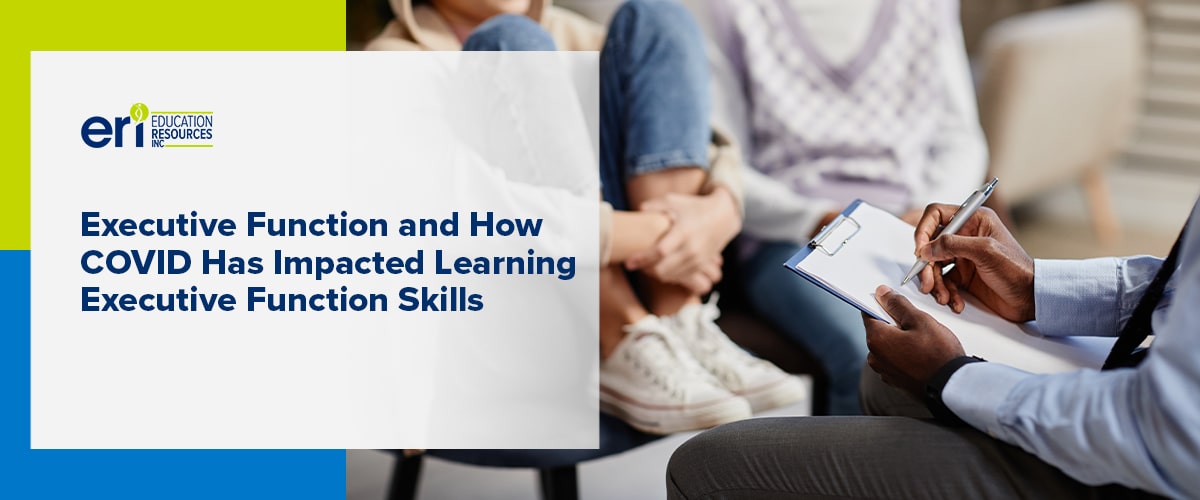
If you are a physical, occupational or school-based therapist, you may have noticed your patients or students struggling with executive function skills. These might include procrastinating more and having trouble managing time effectively. The COVID-19 impact on executive function has been noticed across the board, mainly due to the shift to remote learning.
Learn more about executive function during COVID-19 and how therapists can help their patients and students at this time.
What Is Executive Function?
Executive function refers to the cognitive and mental abilities that help people engage in goal-oriented actions. Executive function directs our actions, self-regulations, behavior and motivation to achieve goals and prepare for future events.
We begin developing executive function skills by age 3 and develop them fully in adulthood. Studies show that people with attention-deficit/hyperactivity disorder (ADHD) are 30% to 40% behind in executive functioning development, making them more likely to be motivated by short-term rather than long-term goals, impacting their overall functionality and progress.
The loss of executive function has been noticed in relation to COVID-19, as well, which can affect skills like:
- Working memory
- Flexible thinking
- Following directions
- Solving problems
- Managing long-term projects
Students with executive function problems might have difficulties organizing their materials, setting schedules and sticking to tasks. They might misplace worksheets, reports and other school materials. They might also have trouble keeping track of personal items, regulating their emotions or keeping their bedrooms organized.
How Has Executive Function Been Impacted by COVID-19?
During the pandemic, many children began struggling with executive function in school, including difficulties studying, completing tasks and focusing on learning.
The COVID-19 impact on executive function can stem from:
1. Disrupted Learning Routines
When students enter their classroom, their brains decide that it’s time to focus and learn. That’s why it’s no surprise that remote learning during the pandemic has become troublesome by disrupting the development of vital executive function skills.
State-dependent memory (SDM) refers to the scientifically observed phenomenon that memories are retained more effectively when conditions are consistent. Meaning humans are more likely to remember something when we’re in the same state of mind, location and time of day as when we first learned it.
That’s why the routine-heavy aspect of in-person learning is beneficial. To study most effectively, a defined study location can be explicitly designated for schoolwork. Studying in the bedroom, playroom or dining room won’t be as effective since the brain associates these spaces with relaxation.
Children will especially struggle to force their brains to associate their homes with a place for learning. These new routines can make it difficult for the brain to develop as students attempt to recognize their homes as learning spaces.
2. More Steps for Turning in Homework
Students who struggle with executive functioning often have difficulties turning in homework. Completing tasks can be stressful for these students, and many forget to turn in assignments. During lockdown, this was incredibly challenging since so many schools were fully or partially remote.
Students don’t get a built-in reminder of the teacher collecting homework in these cases. Instead, most schools require online submission that typically involves:
- Completing the assignment
- Taking a picture of it
- Emailing the image to yourself
- Downloading the picture
- Uploading the photo to the school’s online portal
For people with fully developed executive function skills, the task is easy. But for children still developing executive function, it requires several steps, which increases the chance of getting distracted. As a result, many teachers during the pandemic have seen a loss of executive function skills, with many assignments going missing in the completion stage.
3. Stress and Anxiety
The Centers for Disease Control and Prevention (CDC) has seen a significant increase in depression, stress and anxiety across all age groups throughout COVID-19. Children are far from immune to this surge. In fact, as many as 29% of students had increased anxiety symptoms during COVID-19. Stress and anxiety have a massive impact on cognition and executive functioning.
Since anxiety is the brain’s reaction to a perceived threat, it’s no surprise that it gets in the way of executive functions. While the brain’s response to threats may help us run away, it’s not as helpful for completing tasks. With remote schools and a constant cycle of uncertainty in the news, stress has disrupted children’s brains from developing executive function skills.

Therapists Can Learn More About Executive Function With Courses From ERI
COVID-19 and executive function have been a struggle for children around the world. Whether your school year begins online or in person, there are several ways to support your students or patients after the pandemic.
At ERI we care about the empowerment of therapists and their patients. Our courses can help you learn more about executive function and how to support your student’s development of these essential skills. Our faculty consists of experts in the field. We provide dynamic, passionate and engaging courses that teach new strategies and tools to help improve the daily lives of your patients.
Learn more about our courses or contact us today.
